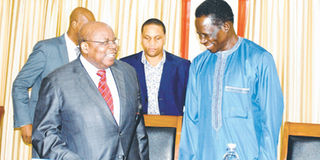Mkapa faces uphill task in Burundi peace

A Burundi peace talk mediator Former Tanzania President Mzee Benjamin Mkapa speaks to special African Union envoy for the Great Lakes Region and Head of the AU Liaison Office in Burundi during the mediation talks in Arusha. PHOTO | FILE
What you need to know:
- He has to ensure that the reconciliation process, which has been going on for nearly a year under his direction, culminated in signing of an Agreement among the warring parties by June this year.
- That is no mean task for the former head of state who is an experienced diplomat with a record of being the longest serving minister for Foreign Affairs in the country’s history.
Arusha. The former president Benjamin William Mkapa and Facilitator of Inter-Burundi Dialogue is facing an uphill task as the East African region ushered in the New Year - 2017.
He has to ensure that the reconciliation process, which has been going on for nearly a year under his direction, culminated in signing of an Agreement among the warring parties by June this year.
That is no mean task for the former head of state who is an experienced diplomat with a record of being the longest serving minister for Foreign Affairs in the country’s history.
Mr Mkapa was picked to be the Facilitator of the Burundi mediation process during the East African Community (EAC) Summit of the Heads of State in Arusha on March 2nd this year and assigned to work closely with President Yoweri Museveni of Uganda, who is the Mediator.
At least three rounds of the mediation talks under the former Tanzanian leader have taken place and now the sponsors of the process as well as the EAC partner states want it concluded so that Burundians can settle down for nation building.
The urge to conclude the talks, hopefully culminating into an agreement, was stressed during the Dialogue held in Bujumbura last month. This was the first time it took place in the country’s capital. The two earlier sessions were held in Arusha in May and July last year.
Last month’s talks was the time regional analysts believe Mr Mkapa consulted widely with Burundi President Pierre Nkurunziza. The former Tanzanian president certainly shared with the embattled Burundi leader him his vision of interventions to be undertaken in the coming months in fulfilment of the EAC Summit of Heads of State mandate.
As expected Mr. Mkapa also consulted with the political parties, diplomatic community, civil society organizations (CSOs), women and youth groups, religious leaders and a number of prominent political actors during his three-day presence in Bujumbura.
In his interactions, he not only appreciated the determination of all stakeholders to come to a negotiating table but recognized the readiness of all parties to engage the external opposition in the dialogue process as part of the fulfilment of the commitments towards inclusivity.
But the Facilitator ran into problems even before the outcome of the dialogue in the Burundi capital had been communicated to the regional leaders and diplomats from the international community who had been closely following up the talks.
Mr Mkapa was accused of bias by Burundi opposition groups in exile. They alleged they were not ready to work with him in search of ever lasting peace in the strife torn country, claiming the former Tanzanian leader considers the current Burundi government legitimate contrary to their position.
In fact, a coalition of opposition politicians based abroad called CNARED wants him to step down as the Facilitator of the peace process on grounds that he favoured the government in power in Bujumbura which in their view was illegitimate.
It was at this juncture that Mr Mkapa ended his silence on the hurdles facing the delicate mediation process in the strife-torn Burundi. He openly blasted those questioning the legitimacy of the current Burundi government.
“It is absolutely out of context and foolhardy to create pre-conditions on the mediation process. The government of Burundi is an equal partner. The presumption that it is not legitimate is wrong”, he told reporters at the end of consultations with key stakeholders in Bujumbura on December 9th.
He said as a Facilitator appointed by the EAC Heads of State he was not tasked to talk on the legitimacy of the Burundi government in power but was much disturbed by those calling for isolation of President Nkurunziza’s regime on grounds that it came to power through unconstitutional means.
“The legitimacy of the Burundi government is not a critical issue here. All parties to the dialogue should focus into the future”, he insisted when questioned on whether the process was slowing down owing to some Burundians who are opposed to the 2015 elections won by the incumbent president but boycotted by some opposition parties.
He cautioned that introducing a question on the legitimacy of the government in charge in Bujumbura at this time would throw the reconciliation efforts by the regional leaders in disarray and deny the people of Burundi their right to engage in the dialogue.
“The government now in power here is recognized by the United Nations, the African Union, EAC and the international community. All the ambassadors posted here have to present their credentials to the president”, he said, noting that it was not the task of the mediators to choose whom to engage in the dialogue or not.




